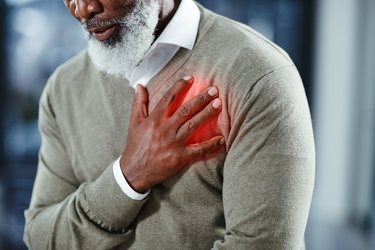
Late-night pizza parties are fun when you're young, but as you age, they can result in a burning sensation in your chest that lasts until you wake up the next morning. What gives?
If heartburn is a regular occurrence for you after mealtime, it could have to do with your age. That's because certain factors associated with aging may worsen heartburn symptoms and leave you feeling like a fire-breathing dragon.
Video of the Day
Video of the Day
Here, gastroenterologist Elena A. Ivanina, DO, MPH, helps us understand why heartburn can worsen with age, plus how to alleviate symptoms and get heartburn relief.
1. Your Muscles Are Weaker
Turns out, muscles have a lot to do with heartburn.
There are two muscle groups that "maintain barriers between the acid in your stomach and your esophagus, called the lower esophageal sphincter (LES) muscles and the diaphragm," Dr. Ivanina says.
LES muscles are ring-shaped and regulate passage of food/liquid between the esophagus and stomach. They often stay closed to prevent things from flowing upward, according to the Cleveland Clinic. The diaphragm is a dome-shaped muscle that separates your chest from your abdomen.
As you age, both these muscles can grow weak along with every muscle in your body. Indeed, "muscle mass decreases by 8 percent per decade after age 30 (and especially after 60)," Dr. Ivanina says.
That means your LES muscles may become weak and loose, allowing acid to travel upward (known as acid reflux) and causing frequent heartburn. And if your diaphragm isn't strong enough, it can also keep the LES muscles from functioning optimally, according to the International Foundation for Gastrointestinal Disorders (IFFGD).
Fix it: “Practice diaphragmatic breathing to help strengthen the diaphragm,” Dr. Ivanina says.
Diaphragmatic breathing, also called "deep breathing" or "belly breathing," focuses on filling your stomach with air, rather than your chest, according to the University of Michigan Health. Not only can this keep your diaphragm strong, but belly breathing also reduces stress and relaxes the body.
Here’s how to practice diaphragmatic breathing, per the University of Michigan Health:
- Sit or lie in a comfortable place. Close your eyes.
- Place one hand on your chest and one hand on your abdomen. The bottom hand should do the moving. The top hand should remain still or only move as the bottom hand moves.
- Inhale through your nose for about 4 seconds, feeling your abdomen expand. (You may feel slight tension the first few times you inhale.)
- Hold your breath for 2 seconds.
- Exhale very slowly and steadily through your mouth for about 6 seconds. The mouth should be relaxed.
- Repeat for 5 to 15 minutes.
2. You’ve Put on Some Weight
With age, people often move less. In fact, 28 percent of adults ages 50 and up are sedentary, per the Centers for Disease Control and Prevention (CDC). This can lead to weight gain, which in turn makes you prone to heartburn.
"Extra weight increases the risk of GERD, or gastroesophageal reflux disease — a chronic form of acid reflux that results in frequent heartburn," Dr. Ivanina says. That's because extra abdominal fat tissue can increase intra-abdominal pressure, she explains.
This pressure may push your stomach up and send acid into your esophagus, bringing on that burning sensation in your chest. For this reason, "obesity is a well-known risk factor for heartburn," Dr. Ivanina says.
Fix it: To reduce heartburn, “it is key to maintain a healthy weight with the right diet and regular exercise, especially as you get older," Dr. Ivanina says. In fact, many studies have demonstrated an improvement in chronic heartburn with weight loss. “For example, women who reduced their BMI by 3.5 or more had a 40 percent reduction in frequent GERD symptoms,” Dr. Ivanina says.
3. You’re Taking Certain Medications
As your birthday candles pile up, your prescription medications can pile up, too.
"Polypharmacy [i.e., the use of multiple medications] is a well-known situation that people find themselves in as they get older," Dr. Ivanina says.
That's because certain chronic health conditions that require medication — such as cardiovascular disease, diabetes and high blood pressure — become more common in old age. And while these medications may be essential for your good health, certain ones may aggravate acid reflux and result in heartburn.
"Some drugs initiate or exacerbate GERD symptoms by reducing LES pressure and muscular contractions of the esophagus (such as calcium channel blockers like amlodipine) or by irritating the esophagus (such as aspirin or other nonsteroidal anti-inflammatory drugs, or NSAIDs)," Dr. Ivanina says.
High blood pressure medications, antidepressants and opiates can also cause heartburn, according to the Cleveland Clinic.
Fix it: “It is important to make sure you discuss all your prescription and over-the-counter medications and supplements with your doctor to make sure they are necessary and not leading to unwanted side effects,” Dr. Ivanina says. If your heartburn worsens, your doctor may be able to prescribe you a lower dose or alternate medication.
4. You Have a Slower Digestive System
Age-related muscle loss can also lead to your gut becoming sluggish, which is not helpful for heartburn. Muscle contractions in the intestinal tract (which help move poop along) tend to decrease as we age — a reason why constipation is more common in older adults.
This also lengthens the amount of time food sits in your stomach, according to the University of Michigan Health. And the longer food lingers (especially fatty, acidic or citrus-y foods), the greater chance of heartburn.
Note: Other gut-based factors — such as age-related changes in your gut microbiome — are also associated with GERD and heartburn, Dr. Ivanina says. But, more research is needed to fully understand the connection.
Fix it: Eat plenty of plant-based fiber, stay hydrated and exercise daily to support healthy digestion and thereby, reduce heartburn, Dr. Ivanina says. Still, it’s important to discuss your symptoms with a gastroenterologist to rule out any underlying health issues, she adds.
5. You Have a Hiatal Hernia
Your heartburn can be caused from a hiatal hernia, which happens "when the upper part of the stomach bulges through the diaphragm into the chest, facilitating back-flow of stomach acid into the esophagus," Dr. Ivanina says.
In addition to heartburn, other symptoms of a hiatal hernia include, per the Cleveland Clinic:
- Bitter or sour taste in the back of the throat
- Bloating and belching
- Discomfort or pain in the stomach or esophagus
- Chest pain
This condition occurs more commonly in older adults — 60 percent of folks over age 60 have a hiatal hernia, according to the Cleveland Clinic.
But why? "It is believed that the size of the hernia increases with age, most likely with increased intra-abdominal pressure [possibly from weight gain]," Dr. Ivanina says. This pressure enlarges the diaphragmatic opening, pushing the stomach up into the chest, she explains.
Fix it: The following lifestyle changes can help limit heartburn (and other symptoms) associated with a hiatal hernia, according to the Cleveland Clinic.
- Maintain a weight that's healthy for you
- Eat smaller portion sizes at mealtime
- Avoid acidic foods — such as tomato sauce, citrus fruits or juice — that can irritate the esophageal lining
- Limit fried and fatty foods, caffeine, peppermint, carbonated drinks, alcoholic beverages, ketchup, mustard and vinegar
- Eat at least 3 to 4 hours before lying down
- Elevate your head 6 inches when lying on your back to help keep your stomach’s contents down
- Quit smoking
- Avoid tight clothing, which can increase the pressure on the abdomen
- Consider taking over-the-counter medications — such as antacids, H-blockers or proton-pump inhibitors — to reduce acid in the stomach
How to Get Heartburn Relief
Relieving heartburn symptoms can involve a few of the options below:
- Over-the-counter medications: Try antacids (like Alka-Seltzer or TUMS) for immediate relief, H2 blockers (like Zantac or Pepcid) for temporary reduction of acid and proton-pump inhibitors (like Prilosec and Nexium) for longer-term reduction of stomach acid.
- Diet changes: Limit acidic, spicy, fatty and fried foods from your diet to see if heartburn symptoms improve. Avoid things like alcohol, caffeine, tomatoes and spices like chili pepper.
- Change in sleep positions: Sleeping with your head and neck slightly elevated can keep acid from coming up into your esophagus.
- Reduce stress: Stress can aggravate heartburn symptoms. Try meditation, yoga or breathing exercises to help relax your mind and body.
When to See a Doctor About Heartburn
"Everyone experiences heartburn from time to time, especially with foods that trigger GERD [and as we age]," Dr. Ivanina says.
But, if heartburn arises as a new symptom, is persistent, doesn't respond to over-the-counter medications and you're experiencing trouble or pain with swallowing, contact your doctor as soon as possible.
Heartburn accompanied with weight loss, anorexia, vomiting, bleeding from the digestive tract and/or anemia may be signs of a more serious health issue, Dr. Ivanina says.
Warning
If you are experiencing heartburn with vomiting, diarrhea or bleeding from your digestive tract, contact your doctor immediately, visit the emergency room or dial 911.
- Cleveland Clinic: “Esophagus”
- University of Michigan Health: “Diaphragmatic Breathing for GI Patients”
- Cleveland Clinic: “Why Does Heartburn Get Worse as You Age?”
- University of Michigan Health: “Constipation, Age 12 and Older”
- Cleveland Clinic: “Hiatal Hernia”
- Centers for Disease Control and Prevention: "Adults 50 and Older Need More Physical Activity"
Is this an emergency? If you are experiencing serious medical symptoms, please see the National Library of Medicine’s list of signs you need emergency medical attention or call 911.


